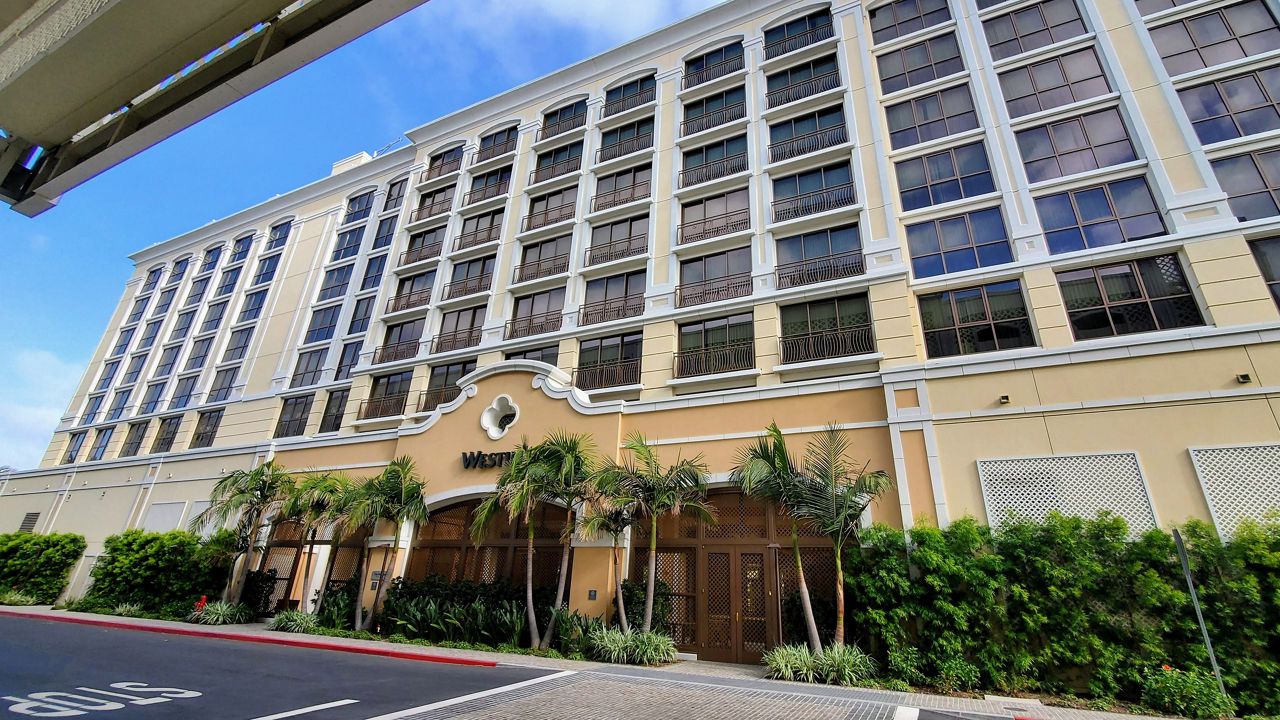ANAHEIM, Calif. — A proposed ballot measure aims to close a loophole that could net the city of Anaheim an additional $3 million in transient occupancy tax to the city's coffers annually.
Residents in Anaheim will ultimately decide on Measure J in the upcoming November election. The ballot would redefine online travel agencies such as Expedia and Priceline and wholesale hotel room sellers as "operators" in the city's tax code and have their customers pay the 15% bed tax for the total price of a hotel night's stay.
"This is an update to ensure we get the proper amount we should be getting," said Mike Lyster, Anaheim spokesman. "Ultimately, it's up to the voters to decide."
Anaheim has 152 hotels citywide. More than half, 80, are located in the city's resort district, the area surrounding the Disneyland Resort and the Anaheim Convention Center.
Before the coronavirus pandemic, the hotels generated more than $167 million in bed tax from the 25 million tourists that flock to the city annually. That money is the most significant contributor to Anaheim's general fund and helps pays for police, firefighters, emergency responses, street maintenance, youth and senior community centers and parks.
According to city officials, online travel agencies have been taking advantage of a loophole in the city's bed tax ordinance. The OTAs only pay tax on the wholesale room rate paid to hotels rather than on the retail rate paid by guests at checkout.
Hotels often partner with online travel agencies such as Expedia and Priceline to help book their rooms.
If the room is booked through the hotel, guests are billed the total rate for the night's stay, parking, resort and other fees, plus the 15% city bed tax.
If a customer uses an online travel agency such as Expedia to book that same room and hotel, then tax is collected on the hotel's flat rate but not the full amount the travel company is receiving.
Behind the scenes, hotel operators charge the online travel agency a wholesale amount for helping sell that room, and the OTAs keep the price difference. The city only receives the bed tax from the wholesale amount paid by the hotel to the OTA.
For example, a hotel operator and online travel company could agree to sell a room for $100 a night, nothing less. However, the online company could charge a customer $150 or $200 or more for that room and pocket the difference. The city will only receive bed tax on the agreed-upon $100 a night.
"This is slightly complicated," said one hotelier in the Anaheim area to Spectrum News. The hotelier did not want to be named because of his relationships in the hotel industry.
"Basically, Expedia is the culprit and has two models: Expedia Hotel Collect - this is where guest pays the full tax on the gross rate at the hotel," he said. The hotelier said Expedia Collect is where Expedia charges the transient occupancy tax on the gross rate but only sends the hotel TOT for the net rate and keeps the difference.
The hotelier added that many OTAs are already changing their ways and giving the city the full bed tax rate because of legal challenges. But there are still a few that have held out.
Expedia did not return a Spectrum News request for comment.
Anaheim has tried to pursue the uncollected hotel tax from online travel companies since 2007. City officials said the city won a $21 million award from online travel companies. The companies filed an appeal.
Five years later, an appeals court ruled that those companies were not liable because they were technically not an "operator" under the city's tax code.
Anaheim wasn't alone in its fight to collect uncollected tax from online travel agencies and companies. Many cities have also joined in, and lost.
In 2016, the California Supreme Court ruled against the city of San Diego, stating that "[online travel companies] are not operators of the hotels and that the markup the OTCs charge for their services is not part of the rent subject to the tax," Justia, a website specializing in legal information, reported.
Since then, many cities such as Anaheim have been changing the definitions of their tax code to include online travel agencies and wholesale companies such as Southwest, Disney and others that book all-in-one inclusive deals as operators.
"The current hotel tax section has language that is outdated, and creates a gap which has allowed online and other travel companies to pay tax on only the wholesale room rate paid to hotels, rather than on the final hotel bill they are charging visitors," the argument for Measure J reads. "Measure J would update the language in the tax code to remove any question about this or other areas where the tax applies. It would assure Anaheim receives its full share of hotel tax revenue."
No arguments against the measure were filed.




